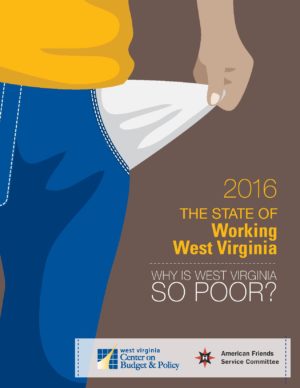This report, the ninth annual investigation of The State of Working West Virginia, comes at one of those times when national attention has been drawn to the state in the wake of the 2016 elections. In an even more unusual twist, much national discussion has focused around the conditions of our working class, an example of which is the surprise success of J.D. Vance’s Hillbilly Elegy: A Memoir of a Family and Culture in Crisis.
This analysis is an effort to cut through often overheated rhetoric and look at the available data and at historical trends. The report begins with review of the long debate regarding the causes of West Virginia’s poverty. These have ranged from cultural explanations to those that emphasize the colonial nature of the economy. It will then proceed to look at current data, including a rigorous statistical regression analysis of the factors that contribute to the region’s poverty. It will conclude with recommendations about how to effectively address it. These are difficult times for the state, with the decline of our dominant industry and the related crisis of the state budget. We hope this effort will support the work of citizens and decision makers as we try to move forward.
Key Findings
- West Virginia has historically been one of the poorest states in the country, with consistently low income and high levels of poverty, and this trend has continued to present day.
- In years since the Great Recession, West Virginia has experienced little job growth and elevated levels of unemployment.
- In recent years, West Virginia has replaced high-wage jobs with low-wage jobs, contributing to decades of stagnant wage growth.
- West Virginia’s laborforce participation rate fell to its lowest level since the late 1980s in 2015, and remains the lowest in the country.
- In order to increase incomes in the state, West Virginia will need to expand its stock of knowledge by increasing the amount of innovative research occurring here, and by substantially raising the educational levels of West Virginians.
West Virginia has suffered from a resource curse, and studies show states with a heavier than average reliance on mining income are likely to have lower incomes.
- Improving the state’s labor force participation rate would make a big difference in the personal income of West Virginians.
- The trickle-down approach to state economic policy that emphasizes putting more money and power in the hands of the wealthy often fails to deliver stronger economic growth or a better quality of life.
- State policies focused on improving productivity and incomes for everyone can not only reduce negative outcomes for West Virginians but also boost economic growth over the long-run by building a stronger middle class.
- State policymakers need to focus on improving health, workforce participation, education, and job skills while also building top-notch infrastructure and encouraging innovation and entrepreneurship. This will require investments in physical and human capital, improving the state’s fiscal health with additional resources, rewarding hard work with higher pay and better benefits, diversifying its economy with clean energy jobs, and supporting technology-based economic growth.
 A persistent question for those who pondered West Virginia’s fate is a simple: why, in a state rich in natural resources, are West Virginians so poor? For more than a century several explanations have been developed by natives and interested “outsiders.” Read the report.
A persistent question for those who pondered West Virginia’s fate is a simple: why, in a state rich in natural resources, are West Virginians so poor? For more than a century several explanations have been developed by natives and interested “outsiders.” Read the report.